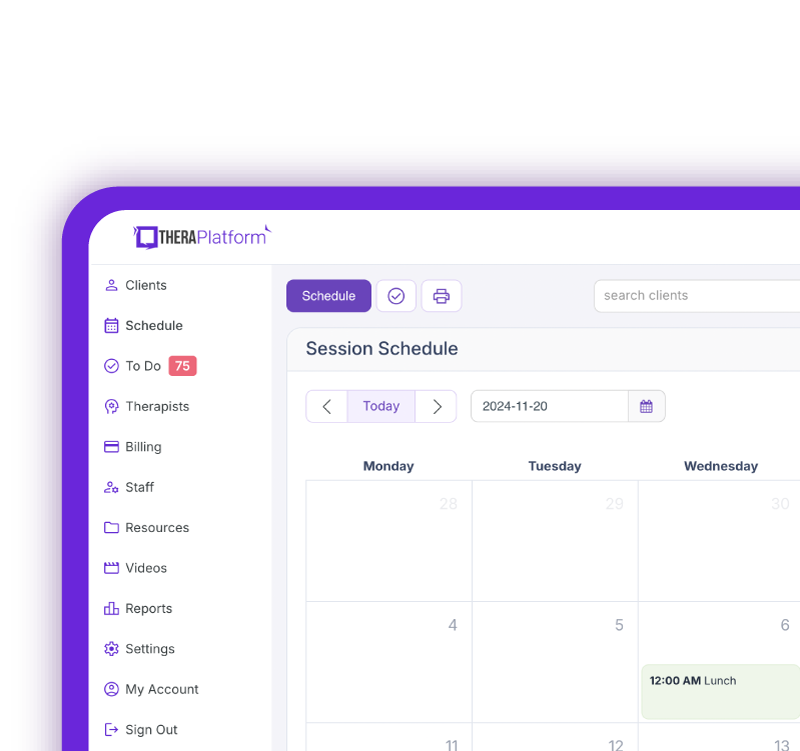ICD 10 code for ADHD

ICD 10 code for ADHD is a common code used for the neurodevelopmental disorder Attention-Deficit Hyperactivity Disorder that develops during early childhood. Approximately 10 percent of children and 4.4 percent of adults will be diagnosed with ADHD within their lifetime. ADHD has several types and its classification can be somewhat confusing. That is where the ICD 10 code for ADHD can help.
Summary
- The ICD-10 code for ADHD is F90, with subtypes including inattentive (F90.0), hyperactive (F90.1), and combined (F90.2), aiding in accurate diagnosis and insurance billing. Enrolling in an insurance billing course for therapists can help providers enhance their knowledge.
- ADHD often presents with comorbid conditions like anxiety, depression, and learning disabilities, complicating both assessment and treatment.
- Early diagnosis and intervention are critical for managing ADHD and minimizing the risk of secondary disorders.
- By leveraging an EHR like TheraPlatform for efficient documentation and claim submission, therapists can tackle billing with ease.
→ Click here to enroll in our free on-demand Insurance Billing for Therapists video course [Enroll Now]
What is the role of ICD 10 code for ADHD in diagnosis?
The International Statistical Classification of Diseases and Related Health Problems, 10th Revision (ICD-10) is a diagnostic coding system endorsed by the World Health Organization (WHO) and used all over the world. It categorizes the multiple types of ADHD to aid clinicians in assessment and treatment.
It is similar to the Diagnostic and Statistical Manual of Mental Disorders (DSM), except it is used internationally and categorizes physical and mental health disorders. Besides assessment, the ICD-10 also provides the codes that are used for insurance billing. The DSM-5TR uses codes that are uniform with the ICD-10. The consistency of codes across the world increases the reliability and validity of diagnosis and the ICD 10 code for ADHD.
Streamline your insurance billing with One EHR
- Claim batching
- Auto claims
- Automated EOB & ERA
- Real-time claim validation
- Real-time claim tracking
- Aging and other reports

Note: The 11th revision of the ICD is currently in use in most of the world. The United States has been slow to adopt it for everyday use, but it is likely to begin to be utilized more regularly in 2024. This is significant because certain diagnoses, including ICD 10 code for ADHD, have different codes in the ICD-11. For example, the general code for ADHD in the ICD-11 is 6A05. Therefore, clinicians need to prepare for changes in coding in the near future.
How is an ICD 10 code for ADHD classified?
F90 is the general ICD code for ADHD. The following are the subtypes of the ICD 10 code for ADHD and their accompanying codes:
F90.0 Attention-deficit hyperactivity disorder, predominantly inattentive type
ADHD inattentive type is characterized by a lack of focus and an inability to follow through on tasks. Think about the child who does their homework but forgets to hand it in.
F90.1 Attention-deficit hyperactivity disorder, predominantly hyperactive type
ADHD hyperactive type is marked by a person that fidgets or can’t stand still. People with this type of ADHD also have difficulty waiting for someone else to finish, interrupt frequently, and leap before they look.
F90.2 Attention-deficit hyperactivity disorder, combined type
Combined type is the most common form of ADHD. It is distinguished by individuals with both inattentive and hyperactive types of ADHD. These individuals are likely impulsive and have difficulty paying attention.
F90.8 Attention-deficit hyperactivity disorder, other type
Often act spontaneously and without thinking and find it difficult to sit still. Mood may change frequently.
F90.9 Attention-deficit hyperactivity disorder, unspecified type
Attention-deficit hyperactivity disorder, other and unspecified types, are used as a diagnosis for situations in which individuals may be experiencing significant ADHD symptoms but do not fully meet the criteria for hyperactive or inattentive types. For example, a child may be having attention problems in school but not severe enough to be diagnosed as inattentive type, so they are diagnosed as “other” type. Or someone may have a mixture of ADHD symptoms that are difficult to categorize and lead to an “unspecified” type. Because of their relative ambiguity, it is best if these types are diagnosed sparingly.
The importance of early diagnosis of ADHD cannot be overstated. A myth about ADHD is that you “grow out of it” as you get older. Rather, people learn to manage the disorder so it does not affect them as much in adulthood. And the earlier the diagnosis, the sooner someone can learn the tools to cope with it. Further, early intervention can prevent problems from snowballing and decrease the incidence of secondary comorbid disorders.
Watch this video to learn common insurance billing struggles and solutions
→ Start My Free Trial
→ Start My Free Trial
ADHD Comorbidity
High levels of comorbidity with ADHD can complicate both its assessment and treatment. The majority of individuals with ADHD are diagnosed with at least one other ICD-10 psychiatric disorder at some point during their life. The most common ADHD comorbidities include learning disabilities, anxiety, depression, and oppositional defiant disorder. A therapist would need to bill ICD 10 code for ADHD plus the comorbidities.
Some of these additional problems exist independently from having ADHD while others may develop because of the disorder. For example, academic problems due to ADHD could trigger feelings of low self-worth and helplessness, ultimately leading to full-blown depression.
Additionally, another disorder can make assessment more confusing. Bipolar disorder and sensory processing disorder, for example, have similar symptoms and can make differential diagnosis more difficult. What’s more, the presence of other disorders complicates treatment. For instance, can you treat more than one disorder at the same time? What if someone has anxiety independent of ADHD? Is it useless to treat ADHD if the client’s anxiety is debilitating? You can see all the complications that might arise from the treatment of comorbid ADHD disorders. It makes intervention much more complex as well as use of ICD 10 code for ADHD along with other ICD 10 codes.
Practice Management + EHR + Telehealth
Manage more in less time in your practice with TheraPlatform

Treatment of ADHD
The following are common ADHD treatments:
Medication
Medication is a frontline treatment for ADHD. Stimulant medications, such as Adderall and Concerta, have been proven effective. However, stimulant medications do come with frequent side effects (e.g., reduced appetite, insomnia) and some people may want to try non-stimulant options, particularly if the stimulants don’t work well. Non-stimulant medications (e.g., Strattera) are generally not effective as stimulants, working in only 50 percent of cases.
Psychotherapy
The following types of therapy are frequently used for ADHD:
Behavior Therapy
Behavior therapy is a popular treatment when working with ADHD in children. It uses conditioning principles to help shape behavior for kids who may have difficulty with attention and impulse control. For example, a parent might use a token system at home, where the child is incentivized for appropriate behavior, such as a star chart that leads to rewards.
Cognitive-Behavioral Therapy (CBT)
CBT combines the principles of behavior therapy but adds a cognitive component. This is important because both children and adults with ADHD may fall prey to negative self-talk. CBT helps them to think more adaptively and, in turn, feel better about themselves and their situation.
Parent training
Parental involvement is integral to a child’s success when they have ADHD. Children may have the necessary structure in a school setting but they also require that at home. Parent training gives parents the tools to provide children with the support they need outside of structured settings.
Social skills groups
People with ADHD often have difficulties in relationships. They are frequently impulsive and hyperactive, and have difficulty modeling social skills. Social skills groups serve a dual purpose: they didactically teach proper social skills and also provide a place to practice them with other group members who may also struggle with interpersonal interactions.
Alternative treatment approaches to ADHD
Diet
Although diet does not appear to play a role in the development of ADHD, there is some evidence to suggest that it can help reduce symptoms. Deficiencies in certain minerals have been found in people with ADHD. Omega-3 and Zinc supplements, for example, have led to improvements. And diets that eliminate certain food additives and preservatives have also exhibited effectiveness in reducing symptoms.
Complementary treatments
Numerous other alternative treatments have been attempted to help with ADHD. Acupuncture, meditation, and neurofeedback all have their supporters but the research findings are largely inconclusive. These types of treatment may help with related problems but their effectiveness as a treatment for ADHD appears limited.
Practice Management + EHR + Telehealth
Manage more in less time in your practice with TheraPlatform

How EHR and practice management software can save you time with insurance billing for therapists
EHR with integrated billing software and a clearing house, such as TheraPlatform, offers significant advantages in creating an efficient insurance billing process. The key is minimizing the amount of time dedicated to developing, sending, and tracking medical claims through features such as automation and batching.
What are automation and batching?
- Automation refers to setting up software to perform tasks with limited human interaction.
- Batching or performing administrative tasks in blocks of time at once allows you to perform a task from a single entry point with less clicking.
Which billing and medical claim tasks can be automated and batched through billing software?
- Invoices: Create multiple invoices for multiple clients with a click or two of a button or set up auto-invoice creation, and the software will automatically create invoices for you at the preferred time. You can even have the system automatically send invoices to your clients.
- Credit card processing: Charge multiple clients with a click of a button or set up auto credit card billing, and the billing software will automatically charge the card (easier than swiping!)
- Email payment reminders: Never manually send another reminder email for payment again, or skip this altogether by enabling auto credit card charges.
- Automated claim creation and submission: Batch multiple claims with one button click or turn auto claim creation and submission on.
- Live claim validation: The system reviews each claim to catch any human errors before submission, saving you time and reducing rejected claims.
- Automated payment posting: Streamline posting procedures for paid medical claims with ERA. When insurance offers ERA, all their payments will post automatically on TheraPlatform's EHR.
- Tracking: Track payment and profits, including aging invoices, overdue invoices, transactions, billed services, service providers.
Utilizing billing software integrated with an EHR and practice management software can make storing and sharing billing and insurance easy and save providers time when it comes to insurance billing for therapists.
Streamline your practice with One EHR
- Scheduling
- Flexible notes
- Template library
- Billing & payments
- Insurance claims
- Client portal
- Telehealth
- E-fax

Resources
Theraplatform is an all-in-one EHR, practice management and teletherapy solution that allows you to focus more on patient care. With a 30-day free trial, you have the opportunity to experience Theraplatform for yourself with no credit card required. Cancel anytime. They also support different industries including mental and behavioral health therapists in group practices and solo practices.
More resources
- Therapy resources and worksheets
- Therapy private practice courses
- Ultimate teletherapy ebook
- The Ultimate Insurance Billing Guide for Therapists
- The Ultimate Guide to Starting a Private Therapy Practice
- Mental health credentialing
- Insurance billing 101
- Practice management tools
- Behavioral Health tools



